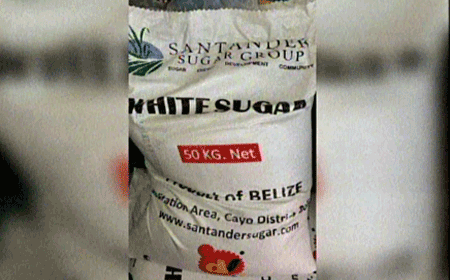Local farmers up in arms; want meeting with Agriculture Minister Godwin Hulse
BELIZE CITY, Mon. May 28, 2018– Santander, the multinational sugar-producing company that began operations in the Cayo District in 2012, may be violating the terms of its EPZ arrangement with Belize by selling its sugar on the local market.
Reports in the local media are highlighting the fact that Santander has apparently begun viewing the local market as just another market where it can garner a quick profit by selling its sugar below the controlled price set by government for local sugar producers.
The move by the giant multinational company, which has its origin in Spain but has large regional investments in Guatemala, has caught local sugar producers by surprise.
On Thursday, the Belize Sugar Cane Farmers Association (BSCFA), Progressive Sugar Cane Producers Association (PSCPA) and Corozal Sugar Cane Producers Association (CSCPA) penned a joint letter to Agriculture Minister Hon. Godwin Hulse.
In their letter, the three companies complained to Hon. Hulse that it has come to their attention that Santander sugar has turned up in local stores in the north and that its sugar is being sold below the controlled price set by government in January 2016.
The companies said that their investigation has confirmed that Santander sugar is being sold in shops in the northern districts of Orange Walk and Corozal.
The letter went on to say that the Belize Bureau of Standards has investigated the matter and confirmed that Santander was only authorized to sell its sugar in the export market, not in the domestic market.
“The sale of white sugar on the domestic market by Santander is of great concern to us and our members,” the joint association letter informed Minister Hulse.
The joint letter goes on to say, “…in several meetings with officials of the Ministry of Agriculture, including yourself as minister, we had been given the assurance that the production of sugar by Santander was solely for the export market and not for the local market.
“The demand and consumption of white sugar in the local market represents a small amount and percentage of total sugar production and sales by BSI, namely, approximately 9,500 tons or seven percent (7%). The payment for cane to our cane farmers is based on the proceeds derived from the sale of this sugar by BSI at the retail price set in 2016.
“The loss of sales of plantation white sugar by BSI represents a direct loss in income to our cane farmers, who number over 5,000 individuals, and indirectly affects over 25,000 persons.
“On the other hand, these sales of white sugar by Santander benefit only a small number of expatriate, non-Belizean, absentee shareholders, who are already benefiting from the sale of their sugar in the international markets.”
The letter goes on to say that sugar is an important commodity that affects the livelihood of the two northern districts, and “we feel this product should be protected from competition.”
The letter then states, “We are, therefore, requesting that you and your Ministry provide us with answers to the following questions: 1. Do the operations of Santander fall under the Sugar Industry Act, No. 27 of 2001 and if not, under which legal instrument do they fall?
“2. Do the terms and conditions of Santander’s operations in Belize include the sale of sugar in the local market, and can the Ministry provide us with a copy of these terms and conditions?
“3. Was Santander given a license to sell sugar in Belize, and who approved this license?
“4. What was the quantity of sugar approved for sale in the local market, and at what wholesale and retail price?
“5. How much sugar has Santander sold in the local market to date, and what is the value of these sales?
“6. Why weren’t the three Associations consulted before a decision was made, if any, to allow Santander to sell its white sugar in the local market?
“In view of the dire financial impact of these sales of white sugar in the local market by Santander on the economic livelihood of our cane farmers, especially at a time when world market prices are at a very low level (US $0.1197 per lb.), we are requesting an urgent meeting with you at 2:30 p.m. on Monday, May 28, 2018 either at your office in Belmopan or at the SCIB office in Orange Walk Town to discuss this grave matter and reach a reasonable resolution with Government support.”
The letter was copied to Jose Alpuche, CEO Ministry of Agriculture.
Up to press time there has been no word on whether Minister Hulse has met with the three farmers’ associations.
Reportedly, Santander wants to get a waiver so that it could gobble up around 15 percent of the local sugar market. The company wants to sell 1,500 metric tons of brown sugar and 3,500 metric tons of white sugar.

